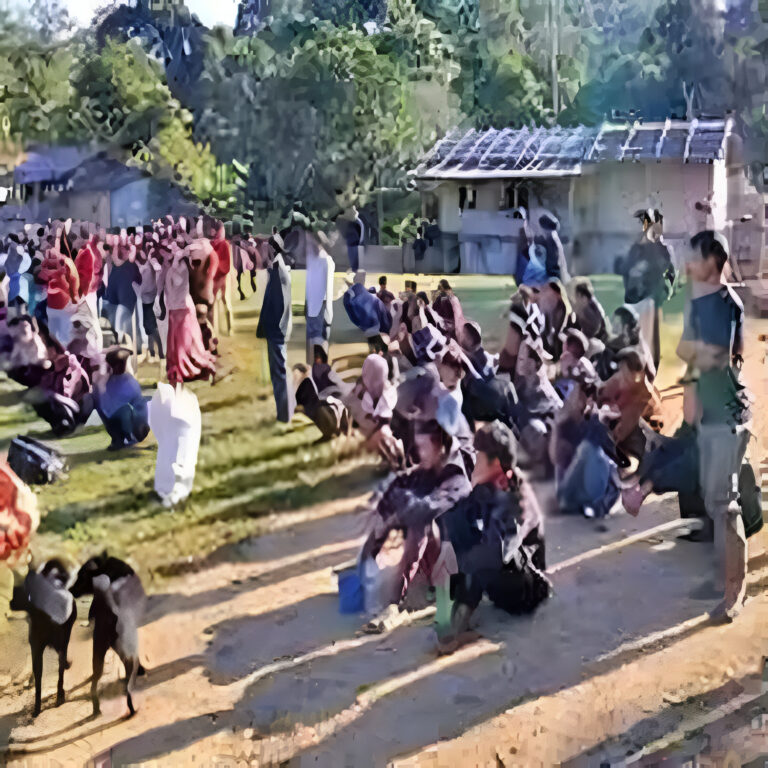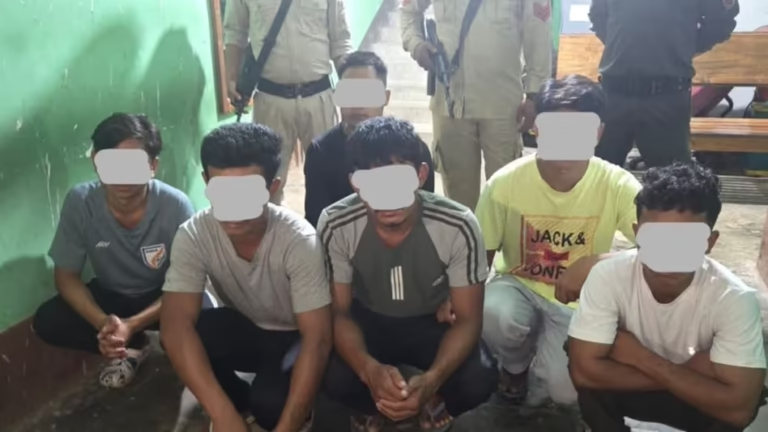Kuki CSOs Add New Conditions for Hostage Exchange: A Closer Look at the Ongoing Conflict
Summary of the News Article
Kuki civil society organizations (CSOs) have laid out additional conditions for the release of hostages in the ongoing conflict in Manipur. These demands are tied to their broader political and security concerns, indicating a deeper entrenchment of the crisis. The hostage situation highlights the ongoing ethnic and political tensions in the region, with both sides engaging in protracted negotiations for a peaceful resolution.
Understanding the Complex Conflict: Kuki CSOs and Their Hostage Exchange Demands
Introduction: The Rising Tensions in Manipur
Manipur, a state in India’s Northeast, has long been a battleground for ethnic and political conflicts. Among these, the Kuki community has been embroiled in a long-standing struggle with the government, often centered around issues of autonomy, land rights, and ethnic identity. The recent addition of new conditions for the release of hostages by Kuki civil society organizations (CSOs) adds another layer of complexity to an already volatile situation.
The conflict, at its heart, is about more than just hostages. It’s a reflection of decades of unresolved tensions between the Kuki community and the state, compounded by recent events that have brought these issues to the forefront. But why are these hostages being held, and what are the Kuki CSOs’ specific demands? Let’s dive deeper into this multifaceted conflict.
A History of Strife: The Kuki-Naga Tensions
To understand the current hostage situation, it’s important to grasp the broader historical context. The Kuki community, which predominantly inhabits the hilly regions of Manipur, has long sought greater autonomy and recognition of their unique cultural and ethnic identity. They have, for decades, felt marginalized by both the government and neighboring ethnic groups, particularly the Nagas.
In the 1990s, violent clashes between the Kukis and Nagas erupted, primarily over land and territorial disputes. These tensions never fully disappeared, even though peace initiatives were introduced. Fast forward to today, and the conflict continues, albeit in a more politically charged environment. The Kuki demand for a separate homeland, or at least more administrative autonomy, remains a contentious issue that has fueled much of the unrest.
The Current Hostage Crisis: What Are the New Conditions?
In the midst of ongoing political turmoil, Kuki CSOs have taken hostages as a strategic move to press their demands. However, in recent developments, they have added more conditions for the release of these hostages. While specifics may vary, these conditions are believed to focus on security guarantees, assurances for land rights, and the halting of operations by security forces in Kuki-dominated areas.
The use of hostages, while controversial, is a bargaining chip for the Kuki CSOs, as it brings international attention to their plight. However, the longer this crisis continues, the more complex it becomes, with negotiations growing increasingly difficult. The government’s response to these new conditions will be critical in determining the future course of the conflict.
Ethnic Identity and Autonomy: The Core of Kuki Demands
At the center of Kuki demands is the issue of ethnic identity and autonomy. The Kukis, like many indigenous groups in Northeast India, seek greater control over their ancestral lands and a stronger voice in the political affairs of the state. They argue that their lands have been encroached upon by other communities, particularly the Nagas, and that they have been systematically marginalized by the state government.
In recent years, the Kuki community has called for the creation of an autonomous hill state, separate from the existing administrative structure of Manipur. This demand has been met with resistance from both the government and other ethnic groups, who fear that such a move could further fragment the already divided state.
The hostage crisis, in this context, is not just about individual hostages. It is about making a statement — a powerful one that forces the government to take their demands seriously.
The Role of Civil Society Organizations (CSOs) in the Conflict
Kuki civil society organizations (CSOs) have played a key role in representing the interests of the Kuki community. These groups, which include various political, cultural, and student organizations, have been at the forefront of the fight for greater autonomy and recognition of Kuki rights. They have also been instrumental in mobilizing support for the community’s demands, both within India and internationally.
However, their involvement in the hostage crisis has drawn criticism from some quarters, particularly for their use of hostages as a means to achieve political ends. Critics argue that such tactics only serve to deepen the conflict and make negotiations more difficult. Nevertheless, the Kuki CSOs remain firm in their stance, insisting that their actions are a necessary response to decades of neglect and marginalization.
The Government’s Response and the Path Forward
The government’s response to the hostage situation has been measured but firm. While they have expressed a willingness to engage in dialogue, they have also made it clear that the use of hostages as a bargaining tool is unacceptable. Security forces have been deployed to maintain order in the affected areas, and there have been ongoing efforts to negotiate with the Kuki CSOs for the safe release of the hostages.
However, the addition of new conditions for the hostage exchange complicates the situation. The government now faces the challenge of balancing the need for a peaceful resolution with the imperative to maintain law and order. Meeting the Kuki demands, particularly those related to autonomy and land rights, will require careful negotiation and political will.
The path forward is uncertain, but one thing is clear: a lasting solution will require addressing the root causes of the conflict, particularly the long-standing grievances of the Kuki community. Without meaningful concessions, the risk of further violence and unrest remains high.
The Role of the International Community
The international community has taken note of the situation in Manipur, with various human rights organizations calling for a peaceful resolution to the conflict. While the situation remains largely an internal matter, the involvement of external actors could play a role in shaping the outcome of the negotiations.
Some international organizations have called for increased dialogue between the Kuki CSOs and the Indian government, emphasizing the need for a negotiated settlement that respects the rights and aspirations of the Kuki community. Others have expressed concern over the use of hostages in the conflict, urging both sides to prioritize the safety and well-being of civilians.
The Importance of Local Support in Resolving the Crisis
While the focus has largely been on the negotiations between the Kuki CSOs and the government, local support will be crucial in resolving the crisis. The people of Manipur, particularly those in the affected areas, are key stakeholders in any peace process. Their involvement in the dialogue, as well as their willingness to support a negotiated settlement, will play a critical role in determining the success of any peace initiative.
Local leaders, civil society groups, and community organizations must be involved in the peace process to ensure that any agreement reached is inclusive and representative of the diverse interests and aspirations of the people of Manipur. Without their support, any peace initiative is likely to face significant challenges.
Looking Ahead: The Future of the Kuki Movement
The Kuki movement for autonomy and recognition of their rights is unlikely to disappear anytime soon. While the hostage crisis has brought the conflict to the forefront of public attention, the underlying issues remain unresolved. The Kuki community continues to seek greater control over their lands and a stronger voice in the political affairs of the state.
The future of the Kuki movement will depend largely on the outcome of the ongoing negotiations. If the government is willing to address their demands in a meaningful way, there is hope for a peaceful resolution to the conflict. However, if the negotiations fail, the risk of further violence and unrest remains high.
FAQs
- What are the new conditions set by Kuki CSOs for the hostage exchange?
The new conditions primarily revolve around security guarantees, land rights, and the cessation of security operations in Kuki-dominated areas. - Why is the hostage crisis significant in the context of the Kuki movement?
The hostage crisis is a reflection of deeper ethnic and political tensions between the Kuki community and the government, serving as a bargaining tool for the Kukis to push for autonomy and land rights. - What role do Kuki CSOs play in the ongoing conflict?
Kuki CSOs represent the interests of the Kuki community, advocating for greater autonomy and recognition of their rights. They have been instrumental in mobilizing support for the Kuki cause. - How is the Indian government responding to the hostage situation?
The government has deployed security forces to maintain order while engaging in negotiations with the Kuki CSOs for the safe release of the hostages. - What are the prospects for a peaceful resolution to the conflict?
A peaceful resolution will depend on the government’s willingness to address the underlying grievances of the Kuki community, particularly those related to autonomy and land rights.



